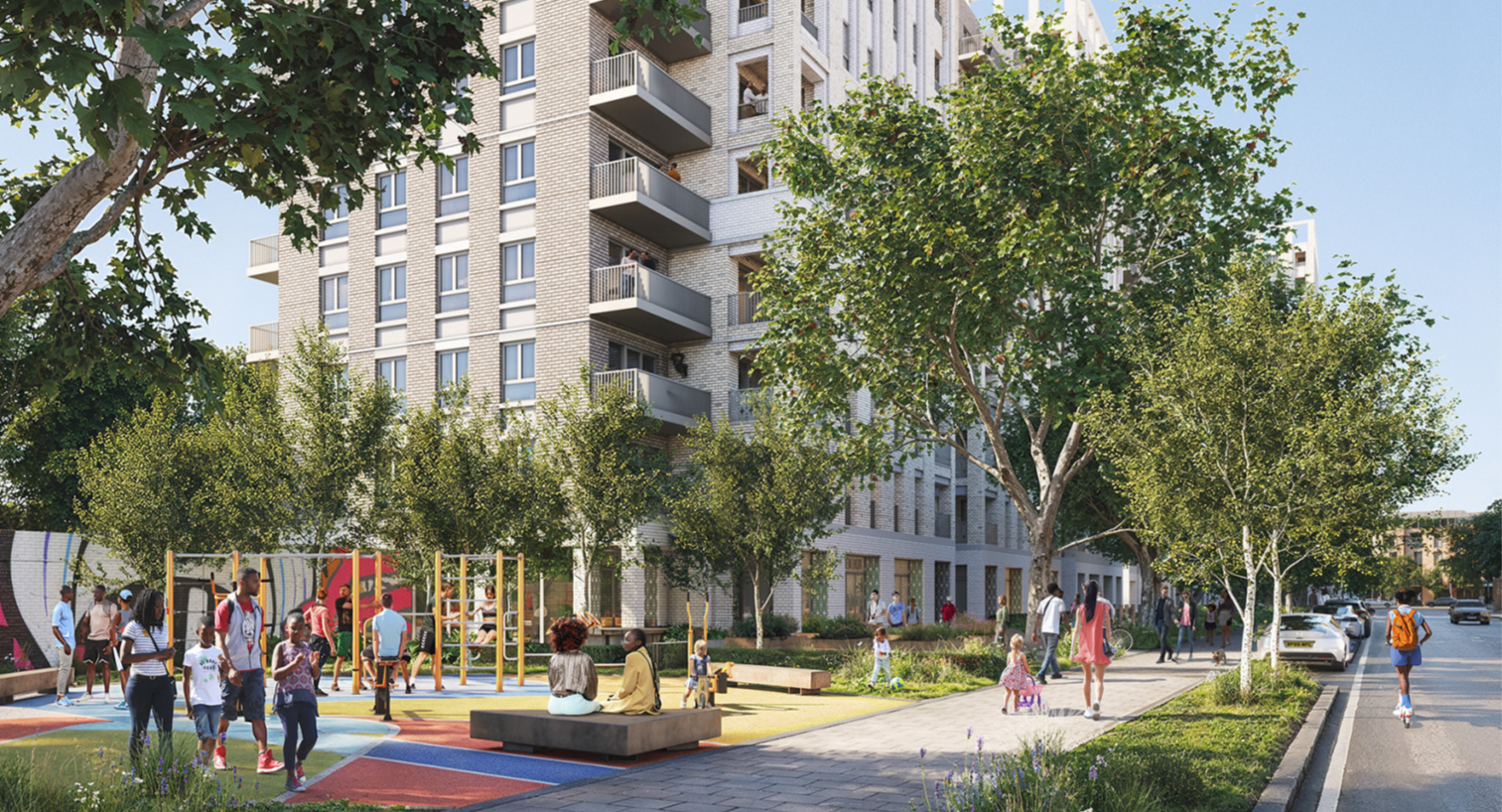 Full rebuilding would substantially increase the number of homes on the estate, including much-needed affordable homes over and above the replacement of the existing 316 Council properties. The proposal would guarantee existing secure tenants a brand new home, with a life-time tenancy, while homeowners would also be able to have a brand new home without the threat of substantial bills from refurbishing the current estate.
Full rebuilding would substantially increase the number of homes on the estate, including much-needed affordable homes over and above the replacement of the existing 316 Council properties. The proposal would guarantee existing secure tenants a brand new home, with a life-time tenancy, while homeowners would also be able to have a brand new home without the threat of substantial bills from refurbishing the current estate.
Cllr Matthew Bennett, Lambeth’s Cabinet Member for Housing, will take the Central Hill recommendation to the council’s Cabinet next month. Cabinet members will make the final decision on the future of the estate. Here, he explains the proposal, how it was reached – and what will happen in the coming weeks.
Central Hill was included in Lambeth’s estate regeneration programme almost two years ago, along with five other estates. It’s been a difficult period for all the residents involved. You’ve already come up with plans for the other five; why has it taken so long to come up with something for Central Hill?
It has been a long process – and one that many residents have said has been too long. Nobody underestimates how difficult and stressful that uncertainty has been, or how disruptive estate regeneration can be for residents. There is a difficult balancing act between responding to some residents’ desire to test and challenge each step of the process, quite legitimately, to fully understand the figures and thinking behind each step; and those who would rather have clarity and pace in decision-making.
Ultimately, I think it’s better to be as transparent and as open as possible, but that does slow things down. It also means that as we start the consultation residents know that we have looked at all options, that they’ve been robustly tested and scrutinised and that’s why we can say with confidence that rebuilding is the best option for the residents of Central Hill.
The recommendation looks like the proposals you’ve put forward for other estates; have you spent all this time coming up with something in line with what you wanted to do with Central Hill all along?
All the estate regeneration proposals come from the same place: despite investing over £400m in improving council housing in Lambeth, with over 12,000 homes brought up to the Lambeth Housing Standard in the past four years; we just don’t have enough money to improve every home. So we have a choice, we can either leave homes run down, with residents living in conditions that simply aren’t good enough – or we can look at other ways of providing a better home.
And if we want to see more genuinely affordable, social, housing built in Lambeth; if we want to keep communities together, if we want to stop the flow of families being priced out of Lambeth, then we need to build more homes. Rebuilding means we have the chance to increase the amount of social housing at council rent levels on the estate and provide more homes for local families.
Unlike on other estates, you’ve only put forward one option. You’ve ruled out a number of proposals, including one from Architects for Social Housing, which would have kept existing homes on the estate. Is it sensible – or fair – to rule these proposals out at this stage?
One of the reasons this has taken a long time was that we’ve looked at every option and tested every proposal. With ASH, they came to the estate in February and claimed they had a proposal that would mean no demolition. On further scrutiny from qualified architects it became clear that ASH’s proposal would not work. They designed buildings that would fail basic building regulations. Walls were too thin, buildings too close together, homes that were inaccessible and too small.
We’ve been at real pains to test and have challenged everything we put in front of residents so that they can have confidence in what the council is proposing. It doesn’t mean all people will like it or support it, but we can be honest and clear about the options that are available to us and treat the issue with the seriousness and respect that it deserves.
Will you actually listen to what the residents themselves want to happen to their homes, or just go ahead? Will residents be able to give their opinion on what you’re planning to do?
Since the start of this process I’ve been clear that we will consult on what is possible. That’s a choice between rebuilding the estate with a new home for our residents, or to sit back with no timetable or identified funding for the estate and so no answer to the question residents always ask about when their homes will be refurbished.
We will absolutely be listening to what residents say about every aspect of the proposals and to hear their views about rebuilding – and about the prospect of doing nothing. The consultation runs until mid-November, giving everyone on the estate a chance to share their views on the proposals, and give the council enough time to listen to what’s being said and respond to any concerns before a decision is made.
Why does Central Hill have to change, when a lot of people claim it is such a beautiful estate? Can’t you just leave it as it is?
As a local councillor over the past seven years, I’ve knocked on doors and asked residents what’s important to them. The same issues have come up again and again: too many homes suffer from damp, from mould, from disrepair; too many homes have problems with their drains, the kitchens and bathrooms are dilapidated and need replacing, roofs and water pipes leak.
We know that there is at least £18m worth of work that’s needed on Central Hill, with some estimates going as high as £40m. We don’t have that sort of money to hand. Many people do appreciate the architecture of the estate, but many tenants live homes which are in a dreadful state. Kitchens and bathrooms are dilapidated, flat roofs leak, the walls are damp with mould, families are overcrowded and there are real problems for older and disabled residents with the layout of homes and the estate. Rebuilding means high-quality new homes for all – and the estate has to work for its residents, not distant admirers.
You have said that the estate regeneration programme will help your pledge to build 1,000 new homes at council-rent levels. Is it fair that Central Hill residents should experience such enormous disruption for the benefit of the rest of Lambeth?
I think everyone accepts that there’s a housing crisis in London, and Lambeth is no exception. It’s not just a crisis in the number of homes, but in their size and quality too.
About a quarter of tenants on Central Hill itself are already on the transfer list, trying to get a home that better meets their needs and is in a better condition. Rebuilding isn’t about some abstract greater good for the faceless masses – it’s first and foremost about providing better-quality homes for the families of Central Hill, it’s about making sure that families have homes that are large enough and properly adapted to meet their needs. But we also have the chance to increase the number of council rent homes for local people.
Across Lambeth we’ve already got plans, made possible through estate regeneration, for hundreds of extra homes at council rent. That will provide a secure, permanent home in the borough for thousands of Lambeth residents. At the end of this process there’ll be more homes, built to a higher standard than those they replace which won’t just be there for current families but to benefit future generations of Lambeth.
Rebuilding the entire estate is a drastic proposal; what benefits could it bring in the long run to those residents who will be losing their homes?
Everyone on Central Hill, tenant or homeowner, will have the option for a brand new home on the estate. Those homes will be larger than the ones they’ll replace, with enough bedrooms to accommodate overcrowded families, built to a higher standard, with better energy efficiency.
Residents will be able to help design the new estate, a new neighbourhood, built specifically for them, to meet their needs. I can’t deny that this process is hugely disruptive – but it’s about making the best of a difficult situation and investing in the future of this community.
But what can you say to the people whose lives will be disrupted over the coming months and years – how will you compensate them for that disruption?
If we had other options, that were less controversial, then we’d be absolutely looking at them. Nobody wants to cause disruption without good reason. The important thing is that we can keep the community together and people will have better homes at the end of this. Financially, tenants will receive a statutory payment of almost £6,000 as compensation, and we will cover the cost of moving too as well as helping with settling in to a new home. If tenants would rather move elsewhere in the borough during the rebuilding then they go to the top of the council’s transfer list with Band A status and can choose a new council or housing association home – and if they like then they get first dibs on new homes on a rebuilt estate and again, the council will help those families move back home.
Many Central Hill residents own their own homes – will they receive the same benefits as council tenants?
Homeowners will get a fair, independent market valuation of their home, with homeowners choosing their own valuer. Resident homeowners will then receive 10% on top of the market price as compensation and have any moving or legal costs covered by the council. They can then either buy a new home elsewhere or on the estate, move into shared ownership with nothing extra to pay; or if someone is in negative equity or homeownership doesn’t make financial sense then we will work with them to find a rented home on the estate at a rent that reflects their income. We want to keep the community together and provide a range of options for leaseholders that suits their individual circumstances so that everyone who wants to stay at Central Hill can do so.
You will be using a wholly-owned company, Homes for Lambeth, to build these homes, but this will have a long-term impact on tenants – for example, on the terms of the tenancies that residents of the new homes will be offered, and their right to buy their homes. Why can’t you just build council homes the way they’ve always been built?
Homes for Lambeth will be a council-owned developer and housing association. This means that Lambeth doesn’t have to partner with a private developer: we don’t have to sell any land and we don’t have to work with an outside housing association. Government rules make it very hard for the council to build in the way it has in the past – it’s why almost no council homes have been built in London for a long time. Lambeth is doing things differently so that we can get things done for our residents. We will still offer homes at council rent levels, with lifetime tenancies, with rights of succession. The one main difference is the loss of the right to buy because we want to invest in homes that will be available for local families well into the future. Central Hill residents who want to buy their home will still be able to move into an existing council home, using the Band A status we’re providing, and exercise their Right to Buy there.
More information about the Central Hill Estate regeneration.


